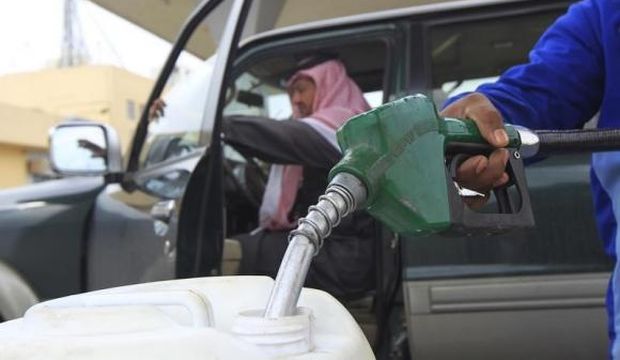
In this December 19, 2012 file photo, an employee fills a container with diesel at a gas station in Riyadh, Saudi Arabia. (Reuters/Fahad Shadeed)
Riyadh, Asharq Al-Awsat—Saudi Arabia is looking to overhaul its costly subsidies system, an informed source told Asharq Al-Awsat on Sunday, at the same time that the governor of the Kingdom’s central bank said the system was “distorting and inefficient” and needed to be reformed.
Reform of the country’s subsidy system was now “very likely,” the source, who requested anonymity, and would mostly comprise redirecting subsidies to lower-income segments of the population.
Saudi Arabia currently subsidizes a number of commodities, including electricity, water and fuel. The Kingdom’s bill for fuel subsidies alone amounts to around 60 billion US dollars a year, making Saudi Arabia the world’s second-biggest spender on fuel subsidies after Iran, according to the International Energy Agency, and allowing Saudi citizens to enjoy some of the world’s lowest fuel prices.
The system has been criticized for being costly, badly targeted, and inefficient. In addition to the heavy bill footed each year, the subsidies, because they are uniformly applied across social strata, end up benefiting the rich more than the poor, some economists argue.
Subsidies have also led to over-consumption and waste, especially when it comes to fuel. The Kingdom is one of the world’s largest domestic consumers of oil, at 2.4 million barrels a day, which accounts for around 25 percent of the country’s total production. According to the Harvard University’s Kennedy School of Government, domestic consumption is also growing at a rate of around 7 percent a year, higher than the annual population growth rate of 3.2 percent.
Fahd Al-Mubarak, the governor of Saudi Arabia’s central bank, the Saudi Arabian Monetary Agency (SAMA), said recently at a conference in Riyadh that the system was “distorting and wasteful” when it came to resources such as fuel and water.
“This means we need to look again into our subsidies system and replace it gradually and in a studied manner with a system targeting those of middle and low incomes while keeping in mind social changes that might occur as a result,” Mubarak said.
Speaking to Asharq Al-Awsat on Sunday, financial expert Fadl Al-Bouainain agreed that the system needed to be gradually phased out and replaced rather than scrapped altogether, adding that the Kingdom was in need of “a smarter system that directs the subsidies to those who need them most.”
State subsidies have long been popular in the Middle East, which accounts for half of the total 480 billion dollars spent on subsidies by governments around the world, according to the Financial Times.
Saudi Arabia is also not alone in the region in seeking to overhaul its subsidies system. Egypt and Tunisia both lifted subsidies on fuel in 2014 in an attempt to cut spending on subsidies and redirect their use.
Egypt also introduced a smart card scheme for both consumers of fuel and bread using quotas for each customer stored on the card’s magnetic strip. Bouainain believed a similar system for fuel could also work in Saudi Arabia.
